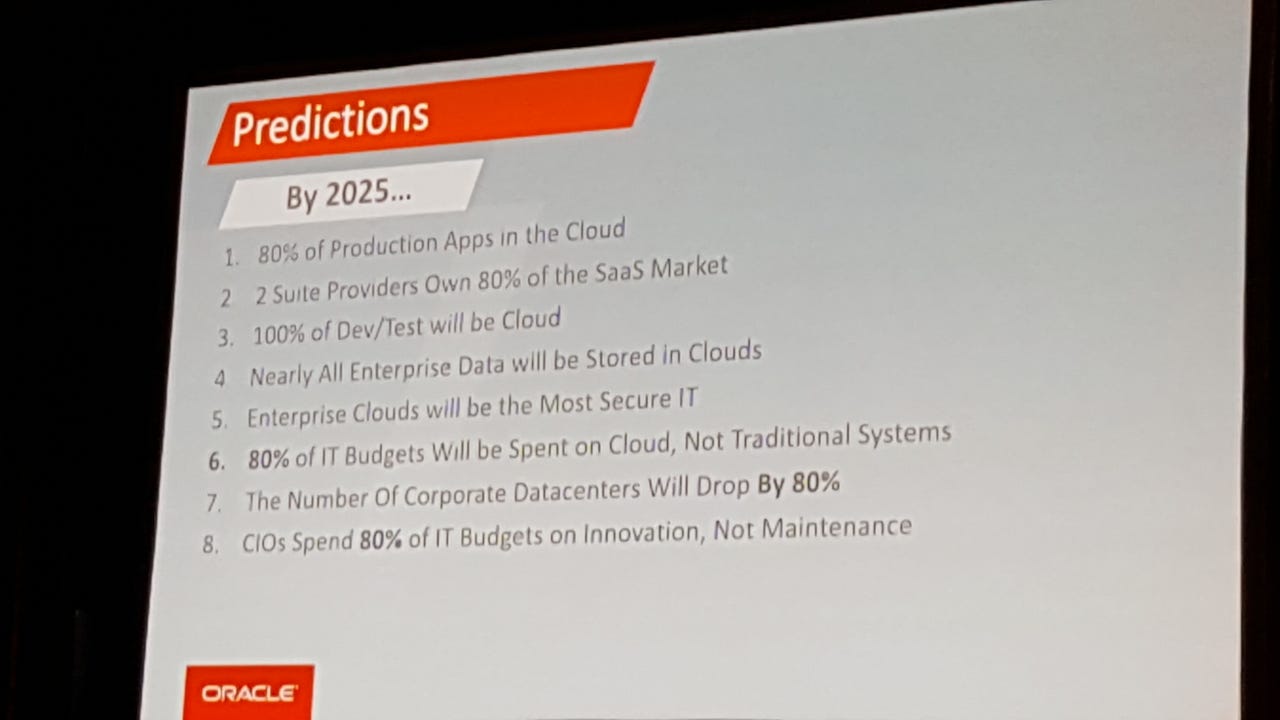Oracle's Hurd: Cloud migration driven by business reality; there will be two SaaS suites


Oracle CEO Mark Hurd said the movement to cloud computing is driven by business realities as much -- if not more -- than technology.
Speaking at his keynote at Oracle CloudWorld in New York, a regional tour designed to land cloud customers, Hurd said the global gross domestic product is growing at about a 2 percent clip. Half of the growth in the world is coming from China. That anemic growth will drive cloud spending.
The upshot is that if a company doesn't count China as a massive market it won't grow. Such a company may become part of the 88 percent of the Fortune 500 that has disappeared since 1955.
Oracle's conference featured tracks for infrastructure and platform as a service, human resources, finance, supply chain, and customer experience. Zach Nelson, executive vice president of cloud strategy for Oracle and former CEO of NetSuite, was also on the docket to talk about the five rules for cloud deployments.
Now rest assured, Hurd was doing a soft sell for Oracle's cloud business. Hurd pitched better security, agility, and the ability to manage budgets as primary reasons for cloud deployments.
But the bigger pitch for Oracle was to line of business leaders who won't have a choice but to migrate to the cloud. Obviously, Oracle wants that migration. Hurd's talk was the high-level approach.
Thomas Kurian, president of product development, did a deep dive of Oracle Cloud including a walkthrough as well as evidence of platform-as-a-service growth, visualization tools for data, and a feel for the user experience when provisioning instances. Kurian also said that Oracle Cloud has an architecture that'll connect to multiple clouds as well as move data.
Hurd noted that CEOs, which have an 18 quarter average tenure, have to cut costs, innovate, and improve customer experience. Most of those things take more than 18 quarters to pay off.
"40 percent of CEOs don't make it 18 months. The job gets ahead of them," said Hurd, who also quipped that "investors are not empathetic to basically anything."
"I have to take share. When GDP is not growing I have to get someone else's customers," said Hurd, who noted that his job is to help CEOs gain market share.
To get those customers, IT will need to change to what Hurd called a generational shift to the cloud. The cloud is the only way that IT budgets will be freed up when most of the spending goes to maintenance, compliance, and regulatory requirements.
Hurd said 80 percent of enterprise apps will move to the cloud. And then came the inevitable hard sell. "Two suite providers will own 80 percent of the SaaS market," said Hurd. "You can't have all of these disparate apps and run your business."
It's obvious that Hurd's bet is that Oracle will be one of the cloud suite providers. SAP CEO Bill McDermott has also said the suite will win. And Salesforce CEO Marc Benioff is building a cloud suite with a customer-centric spin. Toss in Microsoft CEO Satya Nadella and Azure as a rival along with Dynamics 365 and Office. And don't forget Amazon Web Services, which is obviously moving up the stack and threatening Oracle.
"You are going to see turmoil in our industry," said Hurd.
Bottom line: There's going to a crowd vying to be your friendly neighborhood cloud suite.
What's behind the trend of companies moving from public to hybrid cloud: